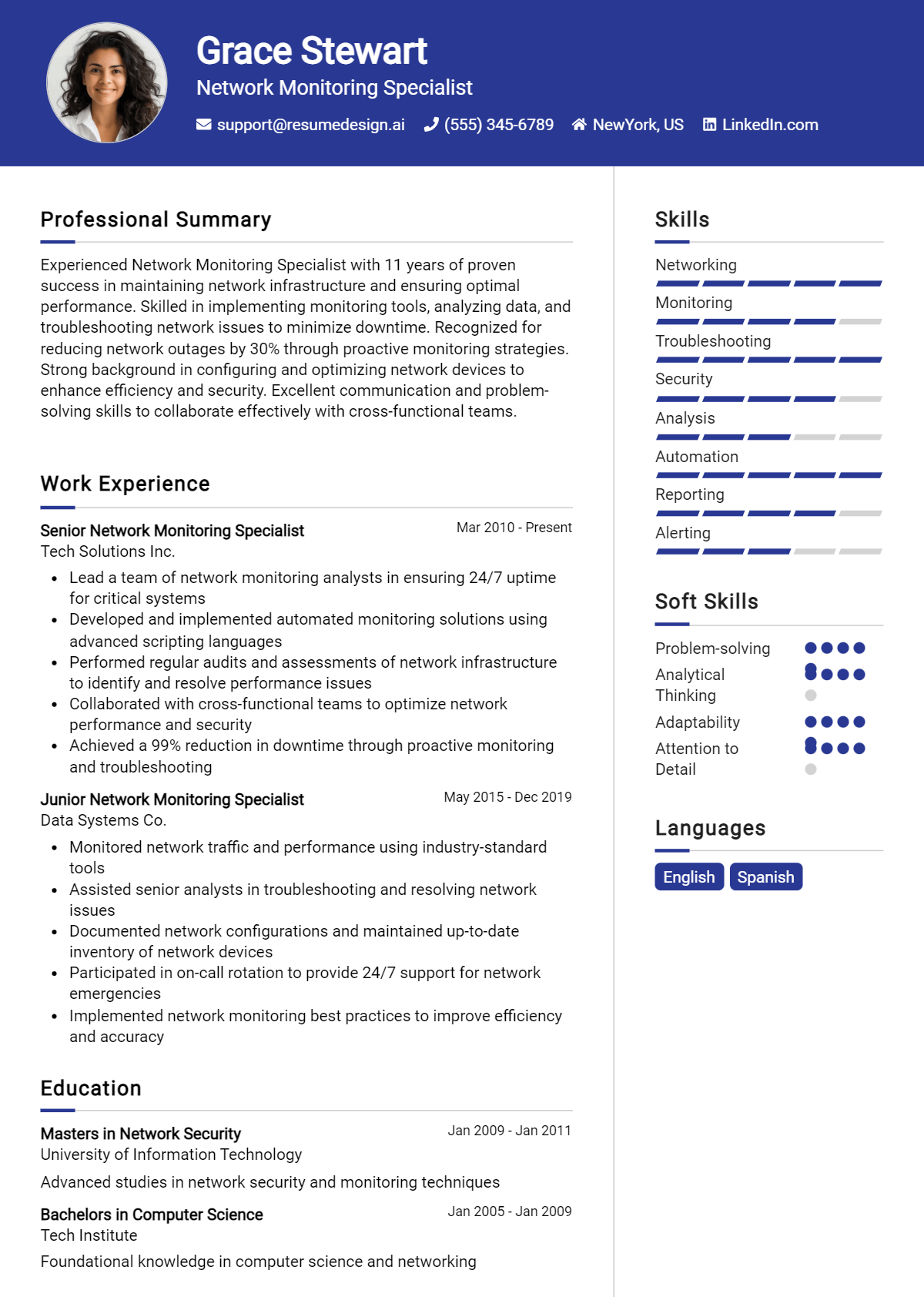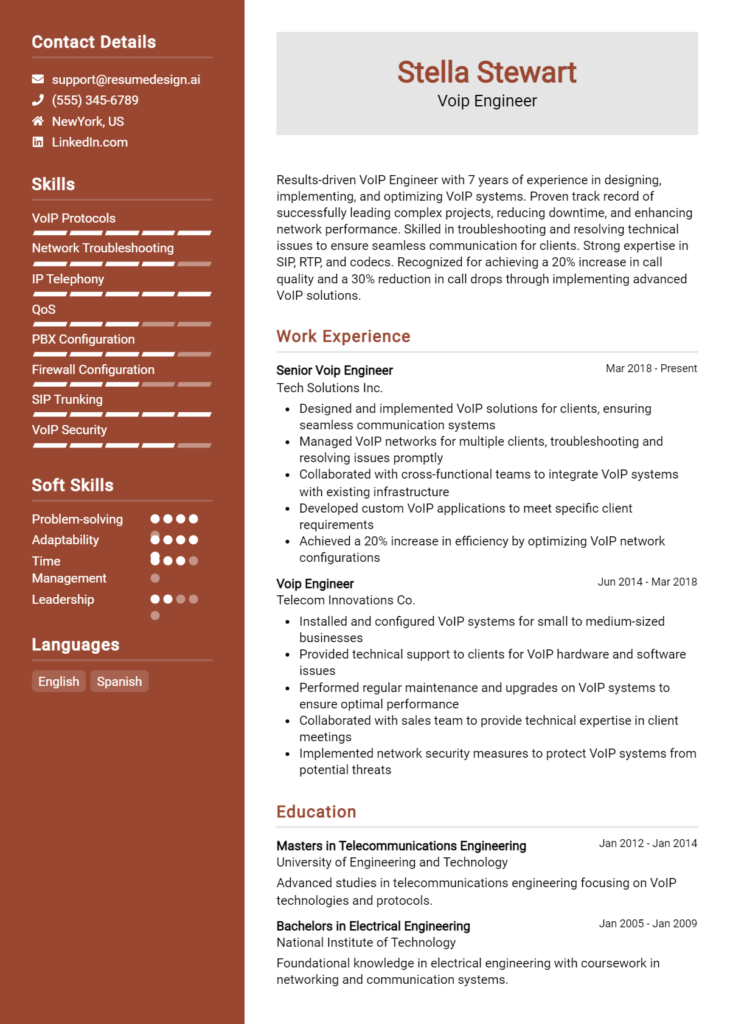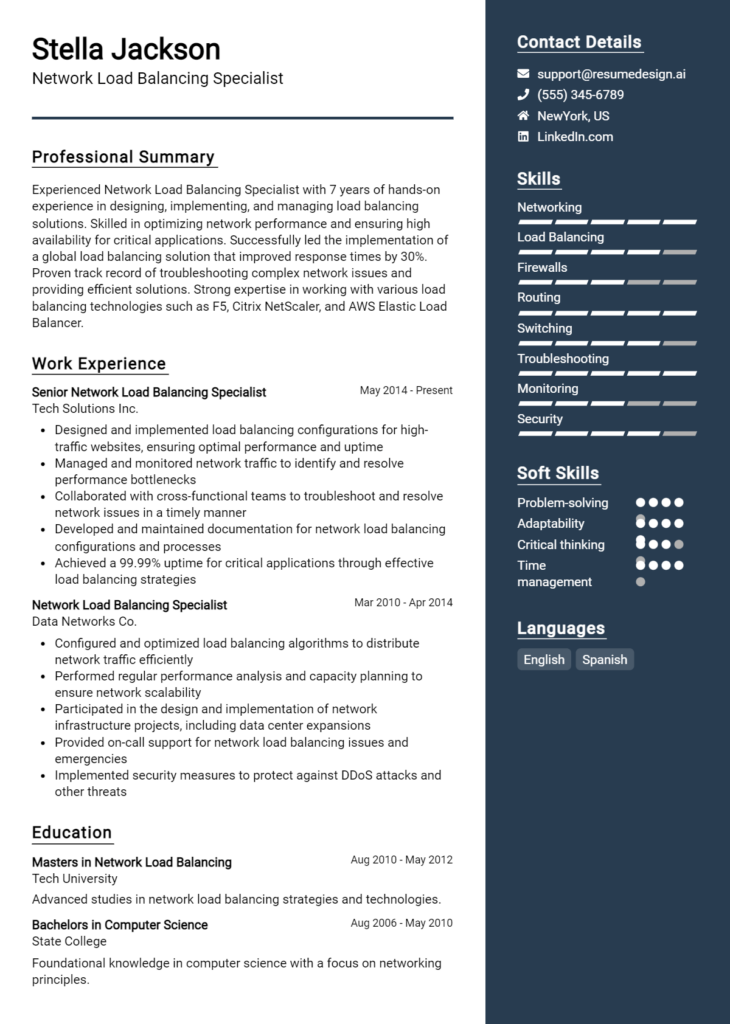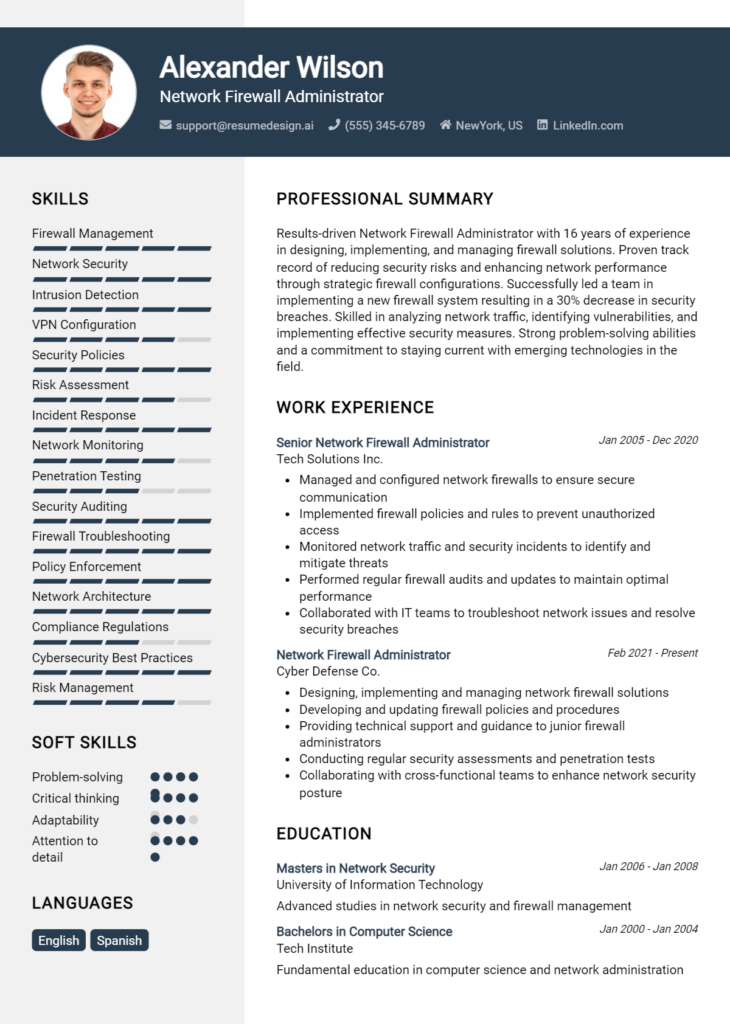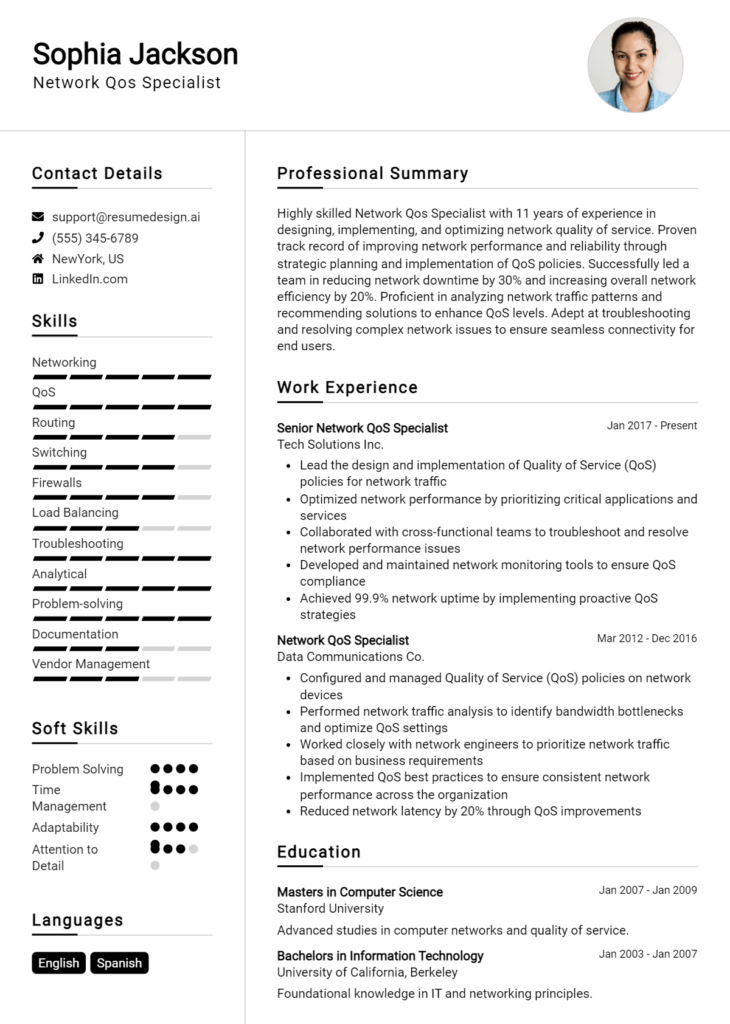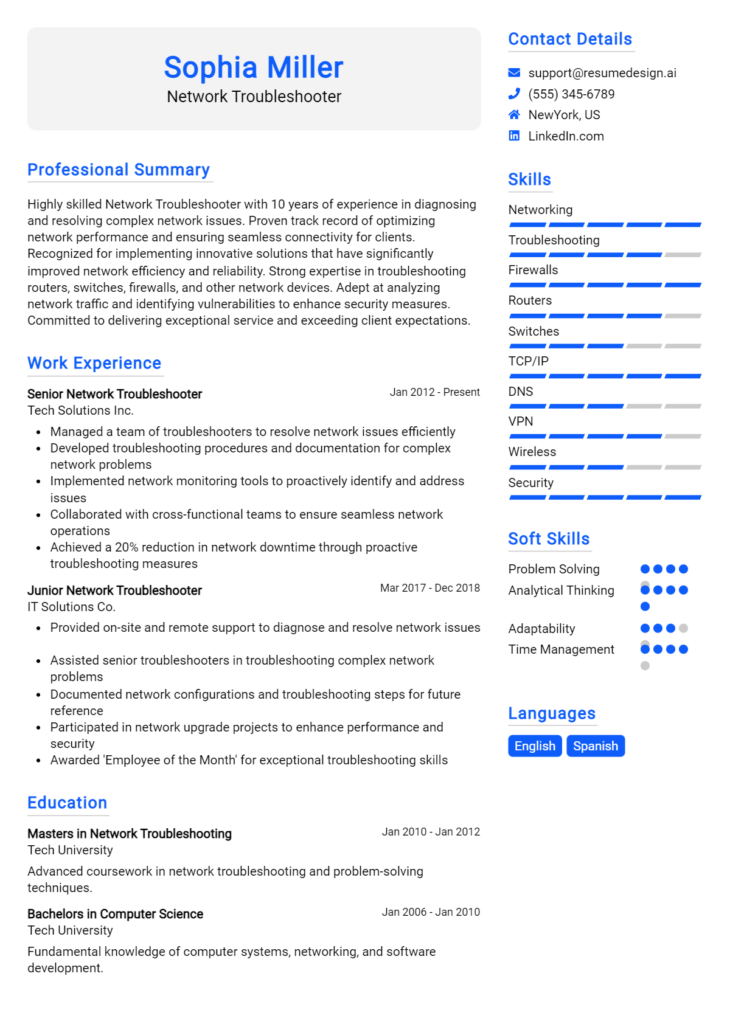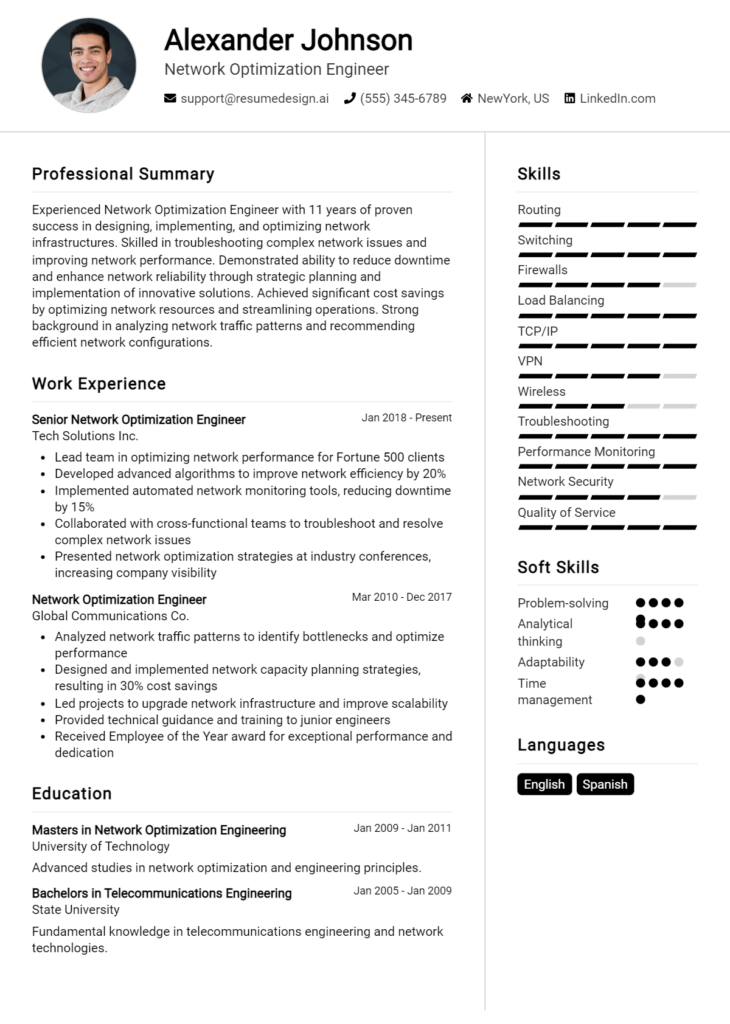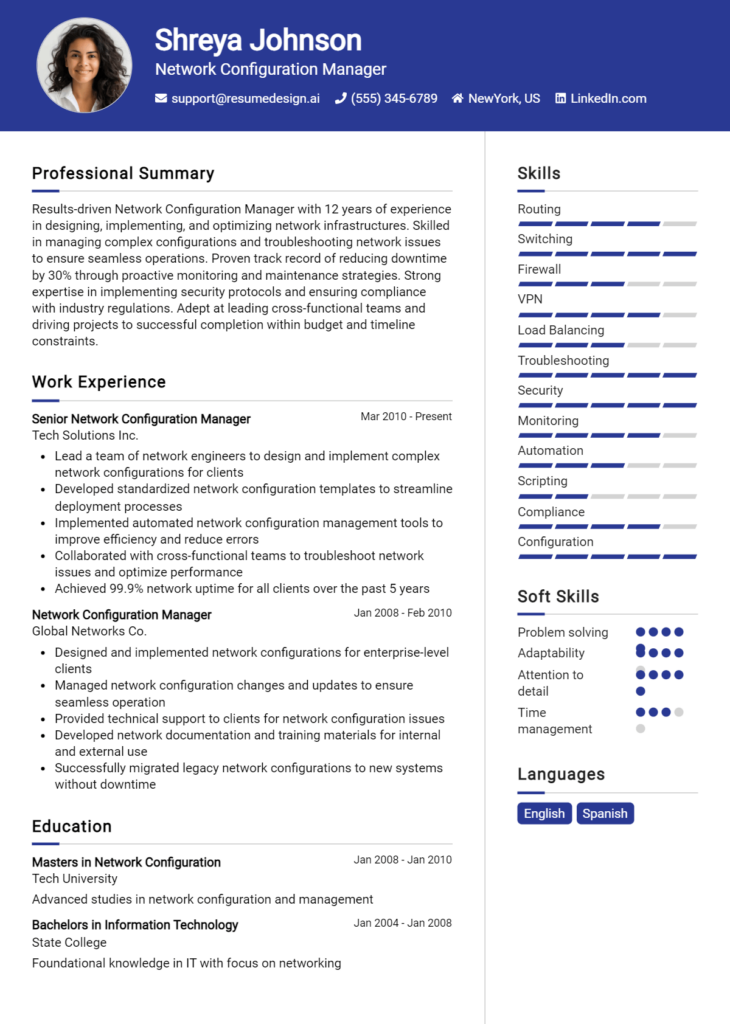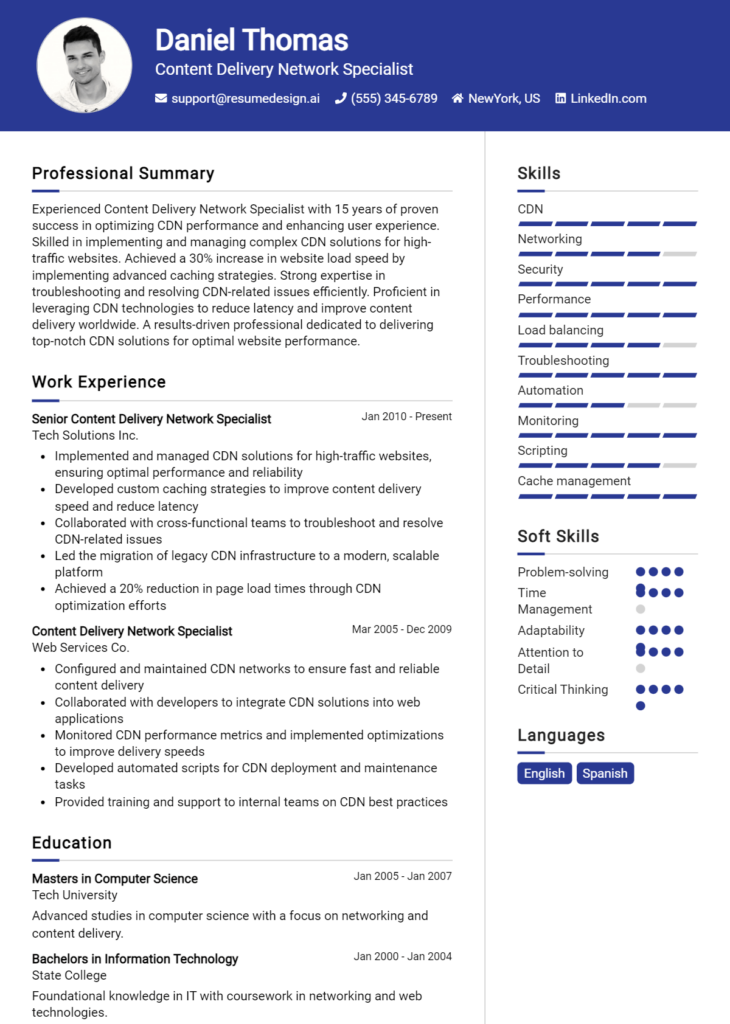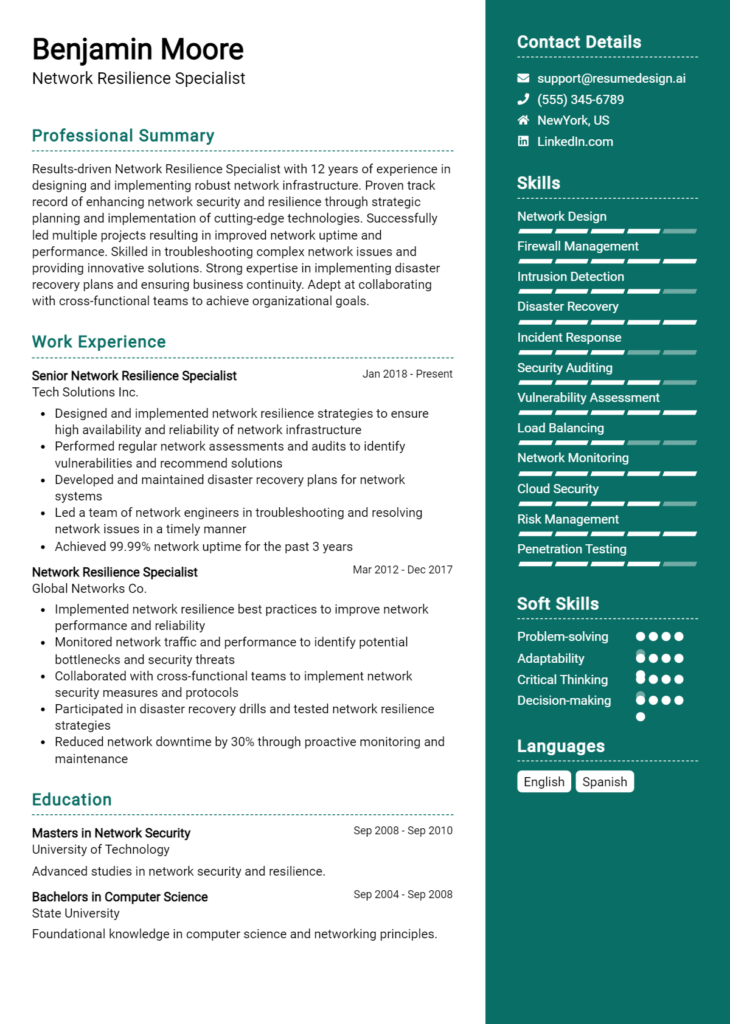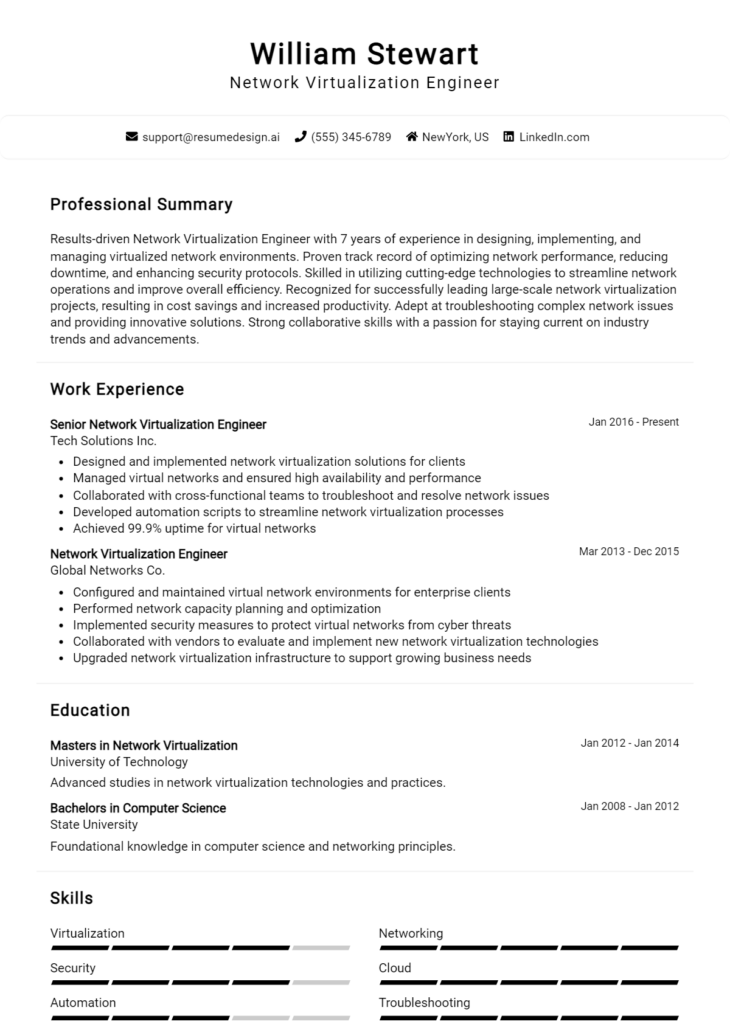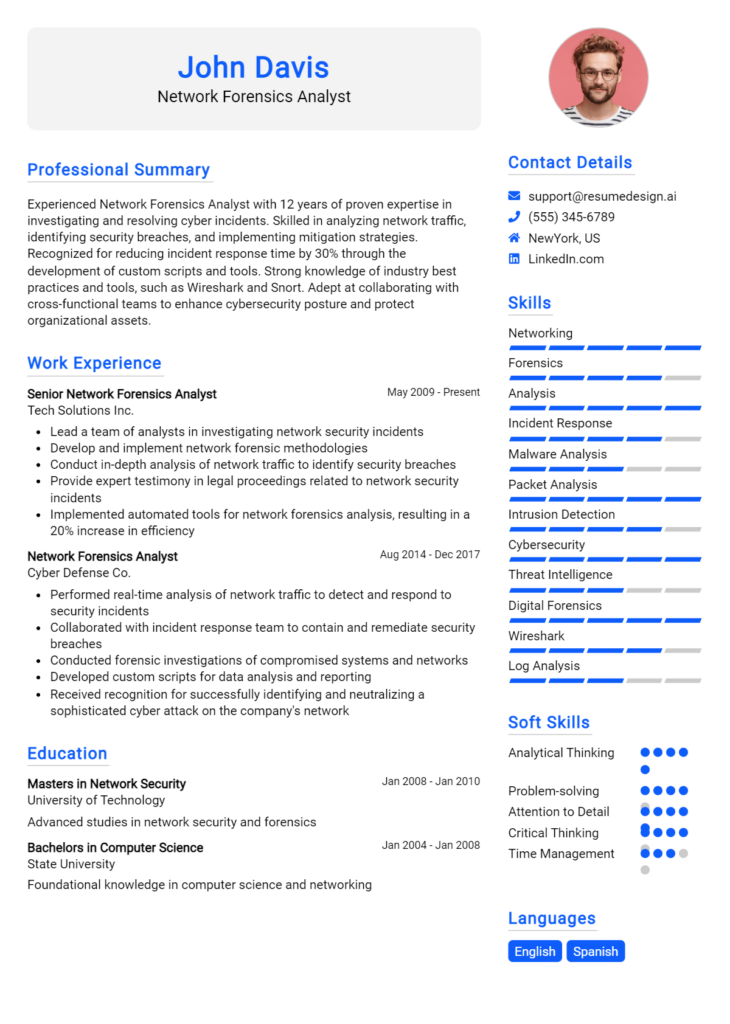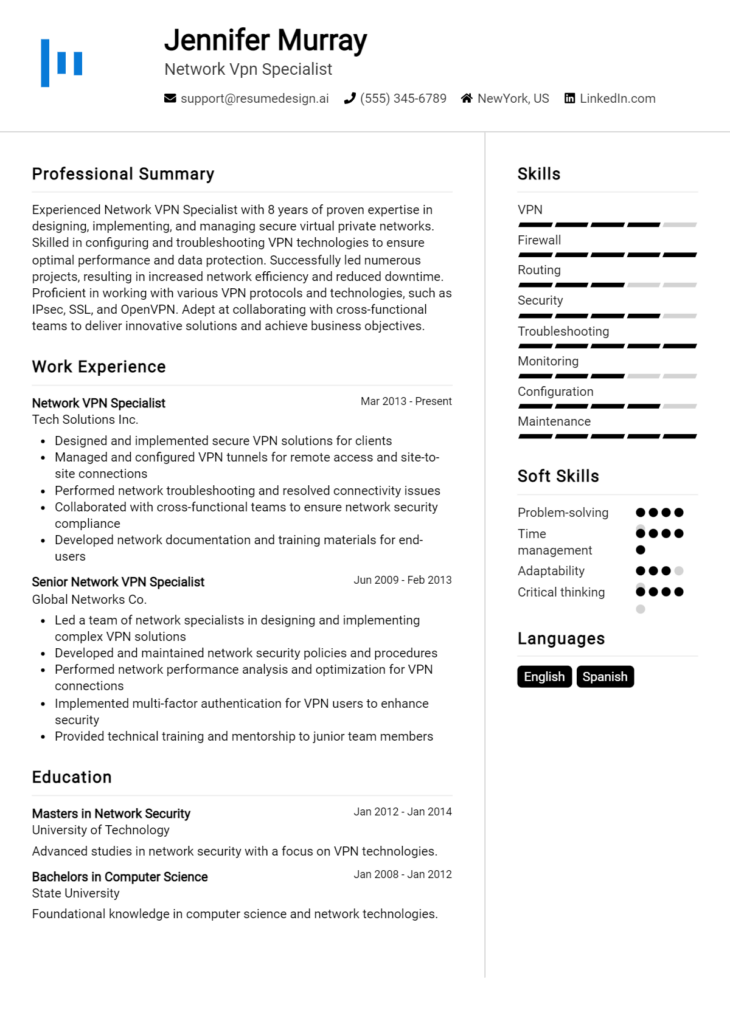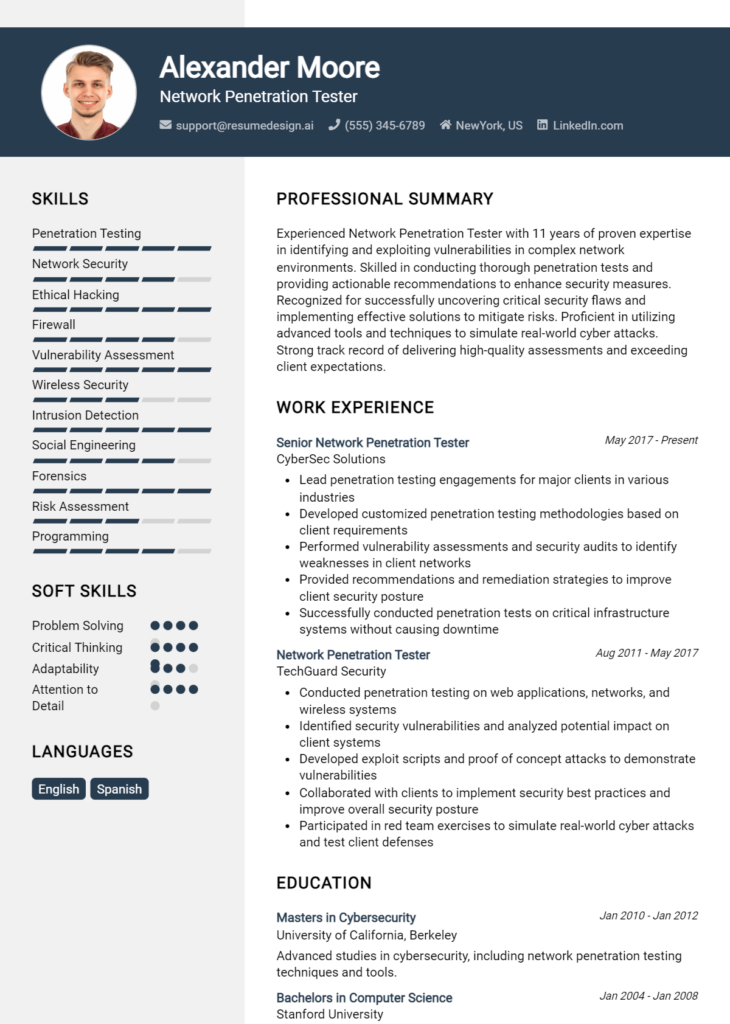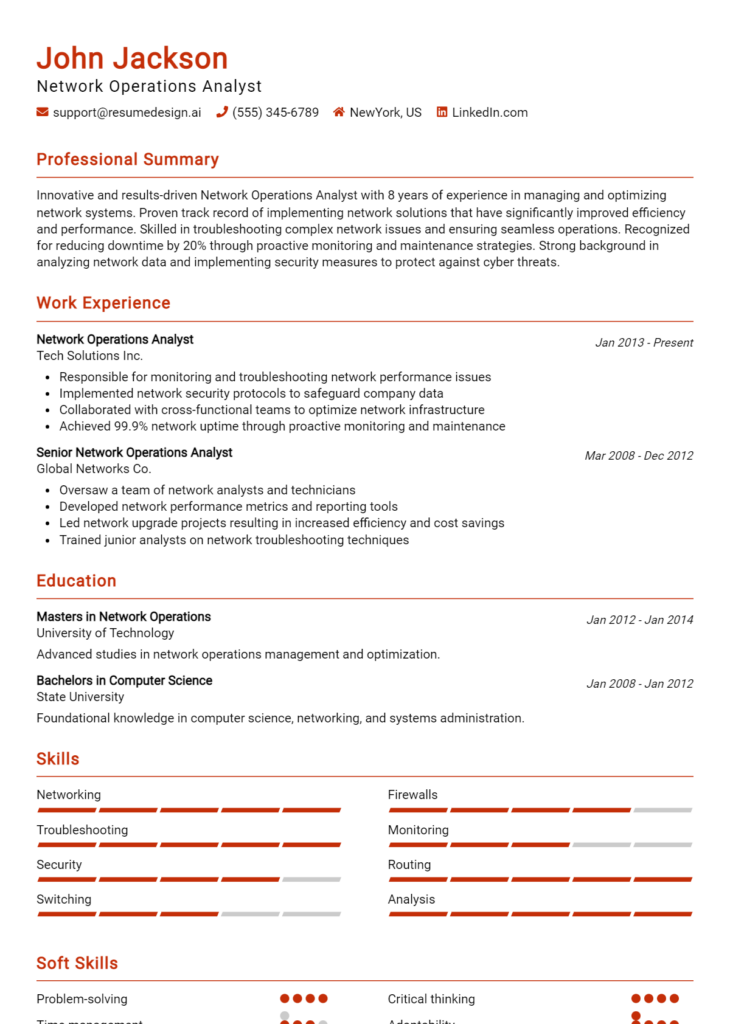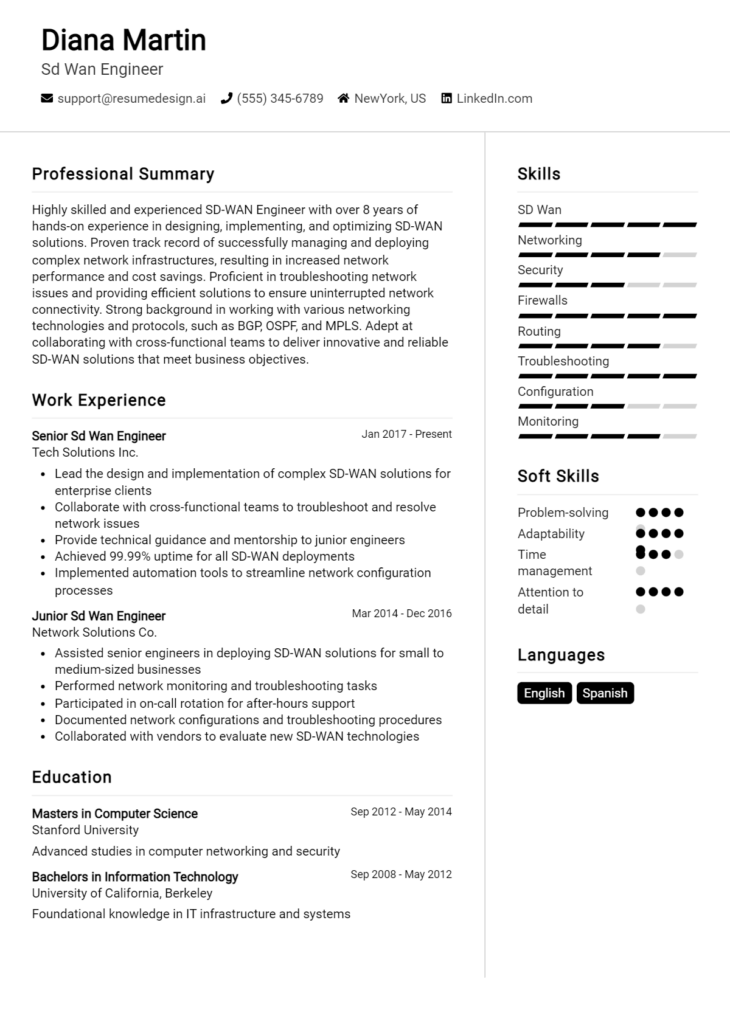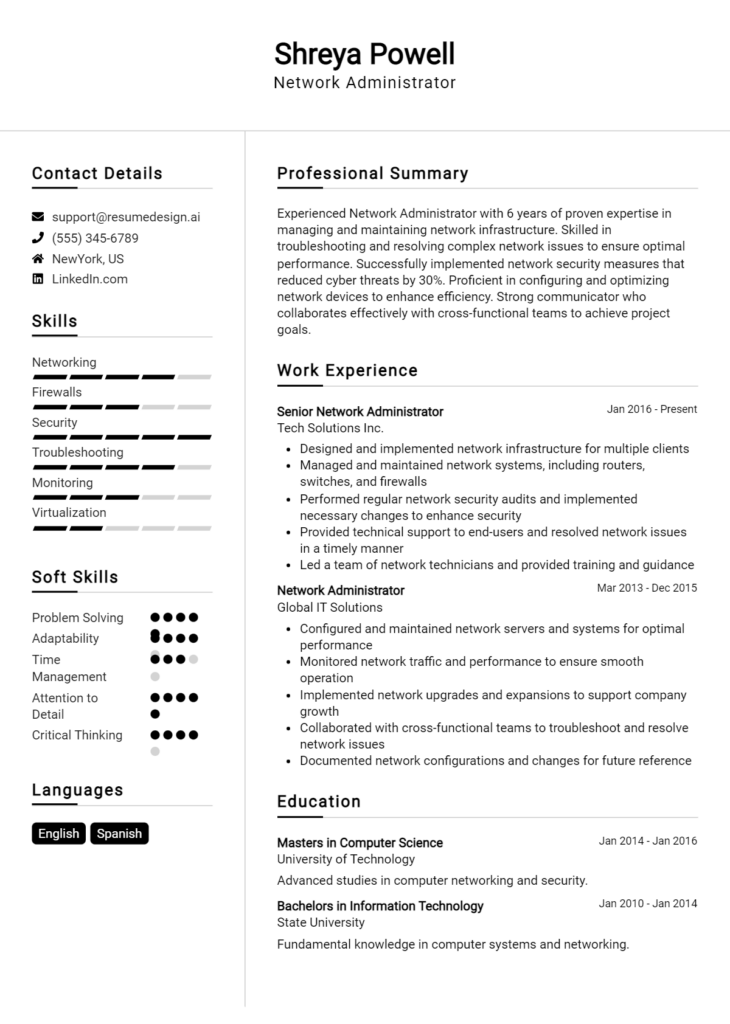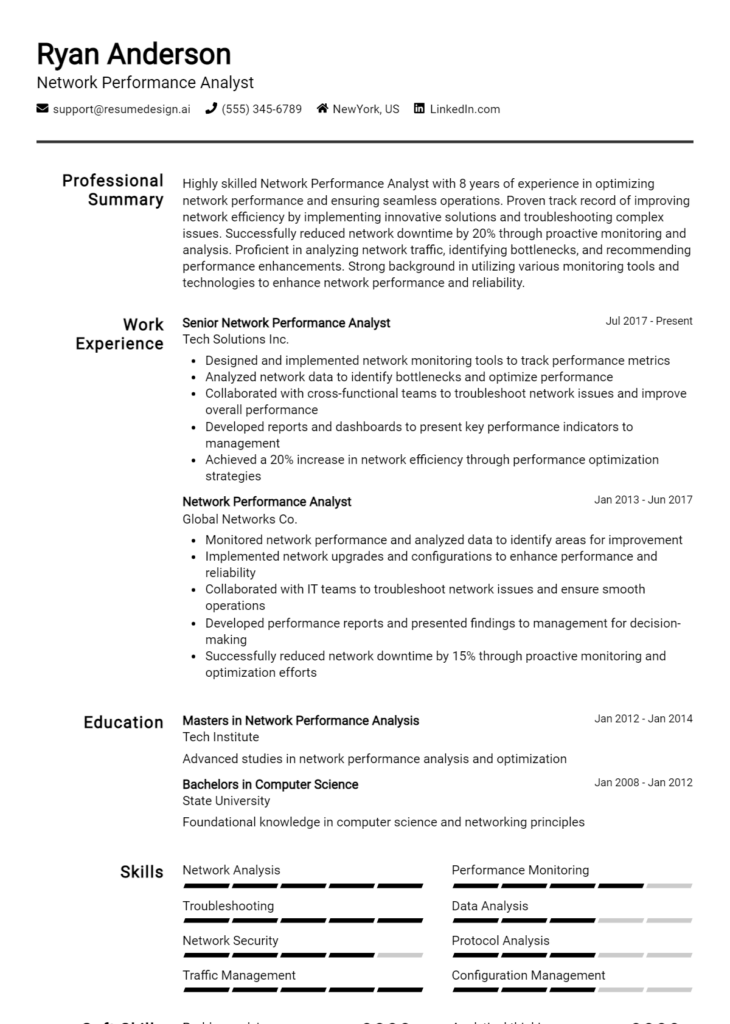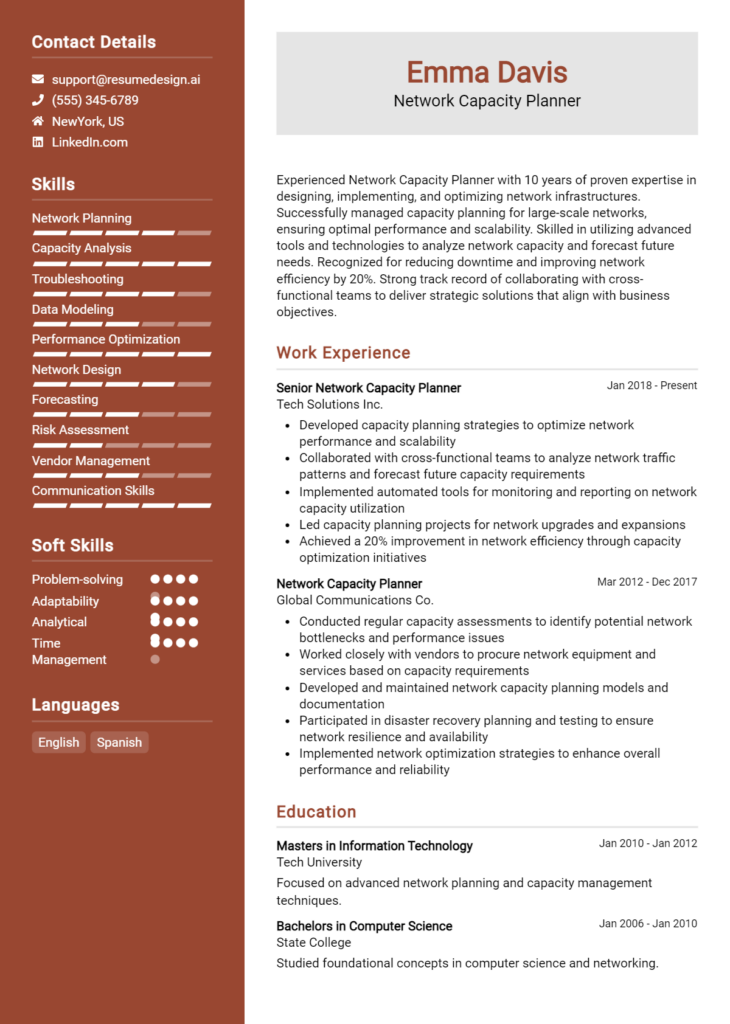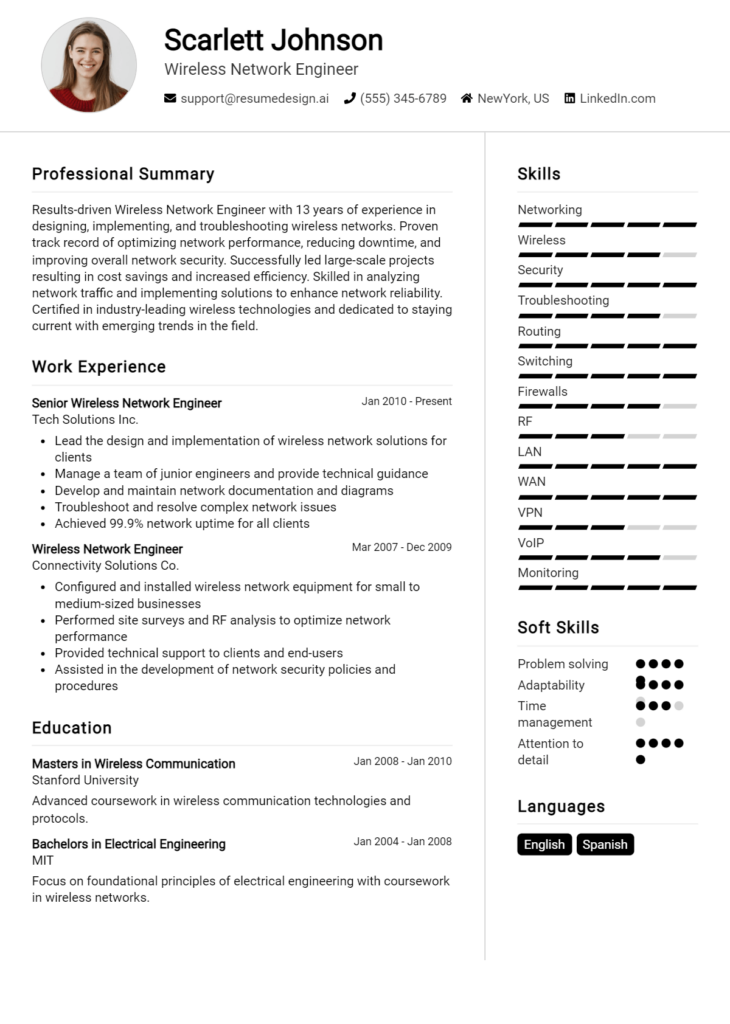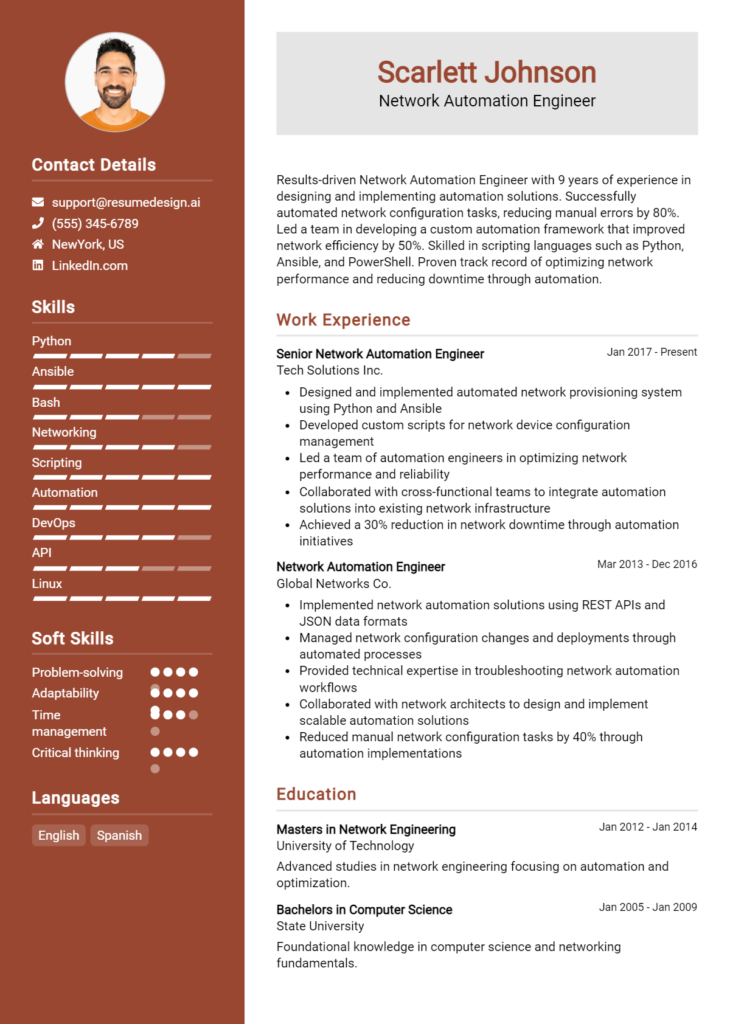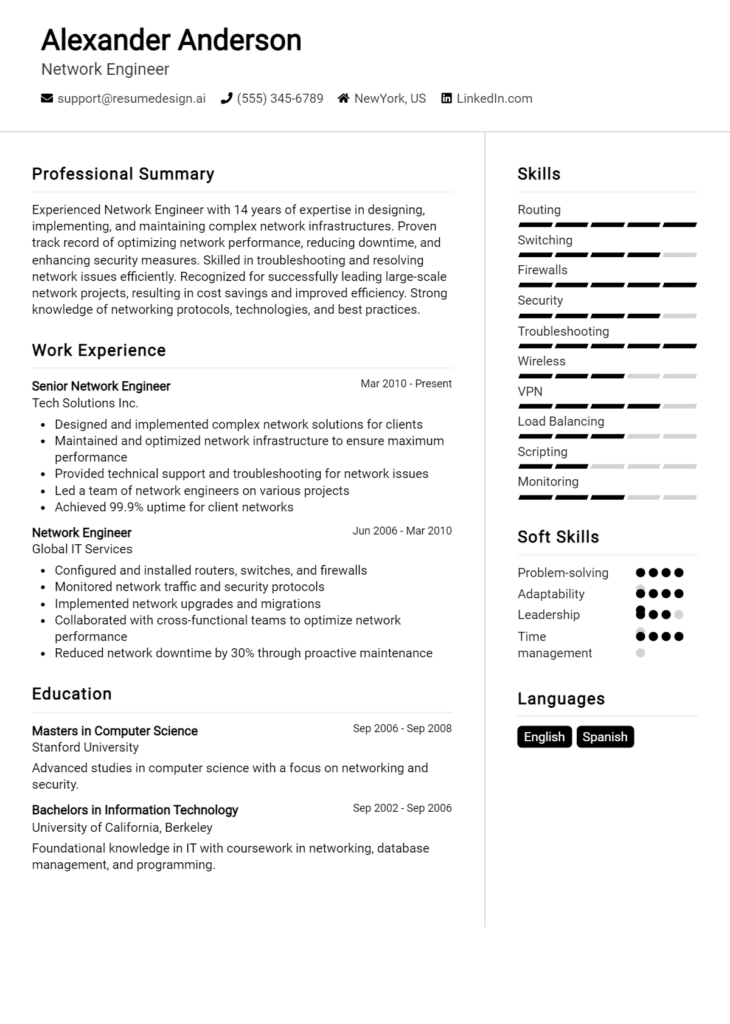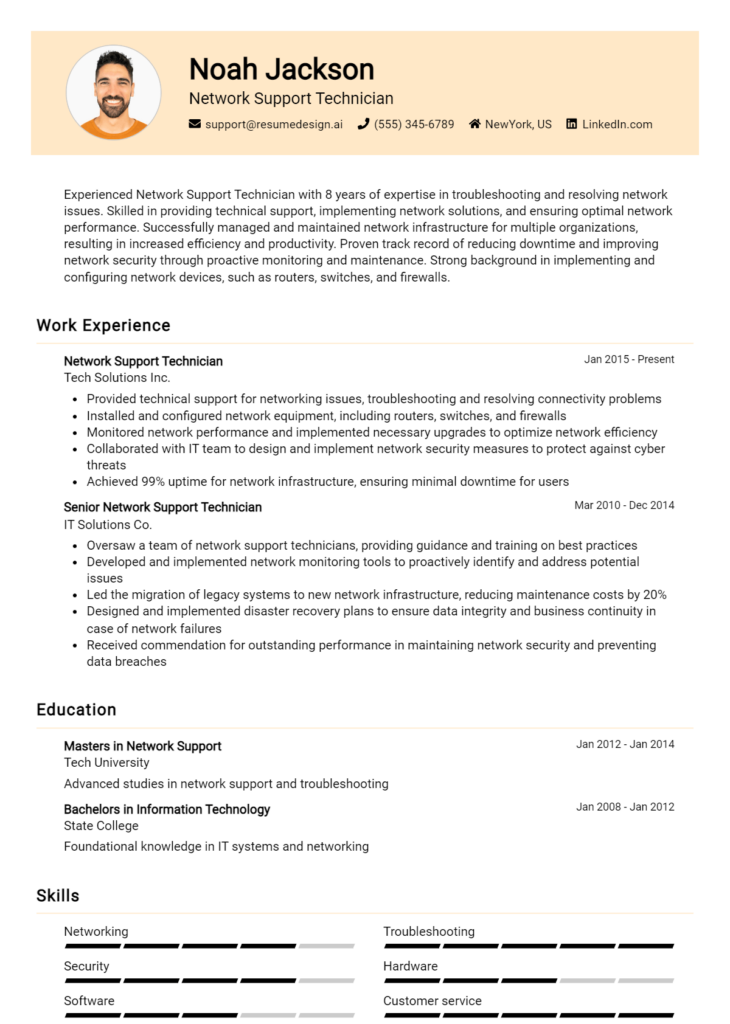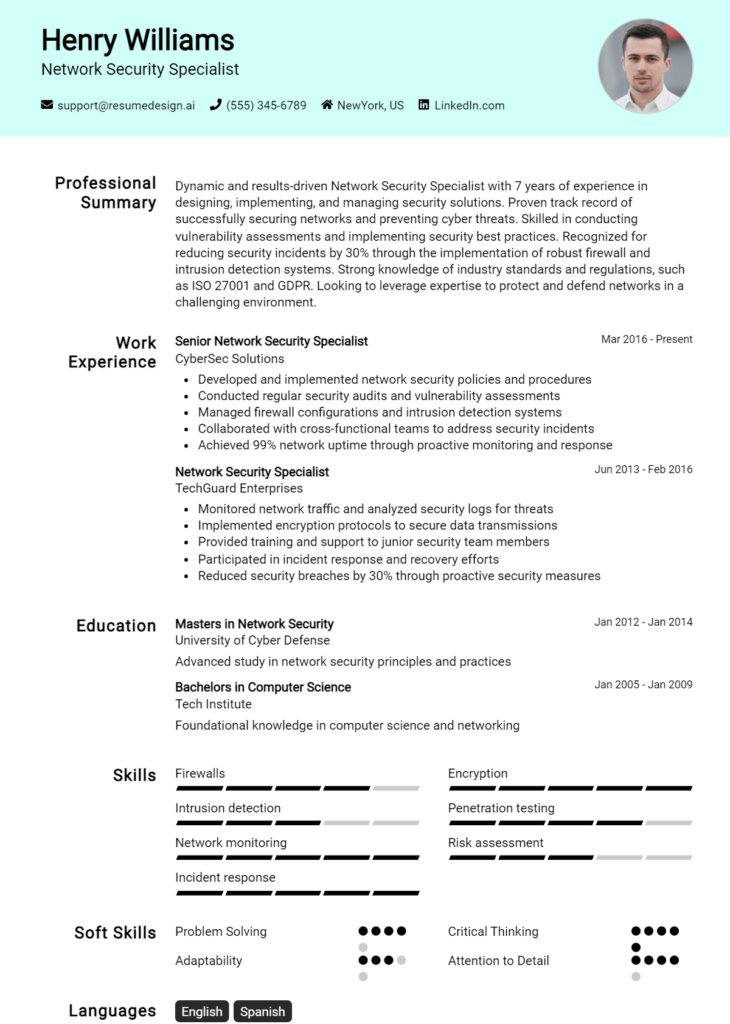XZ8qOaL5SJOyHvFLrgFr
Network Monitoring Specialist Core Responsibilities
A Network Monitoring Specialist plays a crucial role in ensuring the reliability and efficiency of an organization's network infrastructure. They are responsible for real-time monitoring, diagnosing issues, and optimizing performance across various departments. Key skills include technical expertise in network protocols, operational awareness, and strong problem-solving abilities. These competencies are vital for minimizing downtime and enhancing productivity, ultimately aligning with the organization’s strategic goals. A well-structured resume can effectively showcase these qualifications, making candidates stand out in a competitive job market.
Common Responsibilities Listed on Network Monitoring Specialist Resume
- Monitor network performance and availability in real-time.
- Identify and troubleshoot network issues promptly.
- Generate regular performance reports for management.
- Collaborate with IT teams to implement network upgrades.
- Maintain network monitoring tools and software.
- Ensure compliance with network security protocols.
- Assist in capacity planning and resource allocation.
- Provide technical support to end-users and departments.
- Document network configurations and changes.
- Develop and maintain incident response procedures.
- Train staff on network monitoring best practices.
- Stay updated on emerging network technologies and trends.
High-Level Resume Tips for Network Monitoring Specialist Professionals
In the competitive field of network monitoring, a well-crafted resume serves as a crucial marketing tool for professionals aiming to secure their next role. It is often the first impression a candidate makes on a potential employer, and thus, it must effectively reflect both technical skills and notable achievements. A strong resume helps differentiate you from other candidates by showcasing your expertise in network performance, troubleshooting, and security protocols. This guide will provide practical and actionable resume tips specifically tailored for Network Monitoring Specialist professionals to ensure that your resume stands out in a crowded job market.
Top Resume Tips for Network Monitoring Specialist Professionals
- Tailor your resume to the specific job description by incorporating relevant keywords and phrases that match the role.
- Highlight your experience with network monitoring tools and technologies, such as Wireshark, SolarWinds, or Nagios.
- Quantify your achievements to demonstrate your impact, such as "Reduced network downtime by 30% through proactive monitoring and troubleshooting."
- Showcase certifications relevant to network monitoring, including CCNA, CompTIA Network+, or specialized courses in network security.
- Emphasize your problem-solving skills by detailing specific instances where you identified and resolved network issues.
- Include a section on soft skills, such as communication and teamwork, which are crucial for collaborating with IT teams and stakeholders.
- List any experience with performance tuning and optimization of network systems to improve efficiency.
- Detail your familiarity with compliance standards and protocols, such as GDPR or HIPAA, that are relevant to network security.
- Consider using a clean, professional layout that enhances readability while still being visually appealing.
By implementing these tips, you can significantly increase your chances of landing a job in the Network Monitoring Specialist field. A resume that is tailored, quantifiable, and reflective of both technical and soft skills will resonate more with potential employers, making you a standout candidate in this critical area of IT.
Why Resume Headlines & Titles are Important for Network Monitoring Specialist
In the ever-evolving field of network management, the role of a Network Monitoring Specialist is crucial for maintaining efficient and secure communication systems. A well-crafted resume headline or title is essential, as it serves as the first impression for hiring managers reviewing a candidate's qualifications. A strong headline can immediately capture attention, succinctly conveying a candidate's expertise and value proposition in a single impactful phrase. It should be concise, relevant, and tailored specifically to the job being applied for, allowing hiring managers to quickly assess the candidate's suitability for the role.
Best Practices for Crafting Resume Headlines for Network Monitoring Specialist
- Keep it concise—aim for one to two lines maximum.
- Focus on role-specific keywords that match the job description.
- Highlight key qualifications or certifications that set you apart.
- Use action-oriented language to convey impact and results.
- Tailor the headline for each application to reflect the specific role.
- Avoid generic phrases that could apply to multiple positions.
- Incorporate metrics or achievements to add credibility.
- Make it compelling to encourage further reading of your resume.
Example Resume Headlines for Network Monitoring Specialist
Strong Resume Headlines
Certified Network Monitoring Specialist with 5+ Years of Experience in Network Security Optimization
Proficient Network Monitoring Expert Specializing in Real-Time Traffic Analysis and Incident Response
Results-Driven Network Monitoring Specialist with a Proven Track Record in Reducing Downtime by 30%
Skilled Network Monitoring Professional with Expertise in Troubleshooting and Performance Enhancement
Weak Resume Headlines
Network Specialist
Experienced IT Professional
Seeking a Job in Networking
The strong headlines are effective because they are specific, highlight relevant experience, and emphasize the candidate's unique contributions to previous roles. They provide a clear snapshot of the candidate's capabilities and achievements, making them stand out in a competitive job market. Conversely, the weak headlines lack specificity and fail to convey any concrete qualifications or unique selling points, making them easy to overlook and less impactful in capturing the hiring manager's attention.
Writing an Exceptional Network Monitoring Specialist Resume Summary
A well-crafted resume summary is a critical element for a Network Monitoring Specialist as it serves as the first impression for hiring managers. This brief yet powerful overview highlights the candidate's key skills, relevant experience, and notable accomplishments in network monitoring, ensuring that they stand out in a competitive job market. A strong summary quickly captures attention by being concise, impactful, and tailored specifically to the job description, allowing candidates to effectively communicate their value and expertise to potential employers.
Best Practices for Writing a Network Monitoring Specialist Resume Summary
- Quantify Achievements: Use specific numbers to demonstrate the impact of your work, such as the percentage of downtime reduced or the number of networks monitored.
- Focus on Relevant Skills: Highlight technical skills such as knowledge of monitoring tools, network protocols, and troubleshooting techniques.
- Tailor to the Job Description: Customize your summary to align with the specific requirements and keywords mentioned in the job listing.
- Showcase Certifications: Mention any relevant certifications, such as CompTIA Network+, Cisco Certified Network Associate (CCNA), or similar qualifications.
- Highlight Problem-Solving Abilities: Emphasize your capacity to identify and resolve network issues efficiently.
- Keep it Concise: Aim for 3-5 sentences that summarize your professional background without overwhelming the reader.
- Use Action Verbs: Start sentences with strong action verbs to convey a sense of proactivity and effectiveness.
- Reflect Professional Growth: Indicate your career progression and continuous learning in the field of network monitoring.
Example Network Monitoring Specialist Resume Summaries
Strong Resume Summaries
Results-driven Network Monitoring Specialist with over 5 years of experience in optimizing network performance and reducing downtime by 30%. Proficient in using tools such as SolarWinds and Nagios to monitor network traffic and security, ensuring robust data integrity and compliance. Holds CCNA certification and consistently recognized for exceptional troubleshooting skills, leading to a 25% increase in incident resolution speed.
Dedicated IT professional with extensive experience in network monitoring and management. Successfully implemented a proactive monitoring system that decreased network outages by 40% over 12 months. Strong background in analyzing network performance metrics and troubleshooting complex issues, holding a CompTIA Network+ certification.
Accomplished Network Monitoring Specialist with a track record of enhancing network reliability and user experience. Spearheaded a project that improved network uptime to 99.9%, utilizing advanced monitoring software and collaborative team efforts. Expertise in configuring network monitoring tools and providing insightful reports to stakeholders.
Weak Resume Summaries
Network Monitoring Specialist with some experience in IT. Familiar with various monitoring tools and interested in improving network performance.
Detail-oriented individual looking for a position in network monitoring with basic knowledge of technology and a desire to learn.
The strong resume summaries are considered effective because they provide quantifiable results, specific skills, and a clear connection to the responsibilities of the Network Monitoring Specialist role. They demonstrate not only the candidate's qualifications but also the tangible impact of their work. In contrast, the weak summaries lack specificity and measurable outcomes, making them too generic and less appealing to hiring managers who are looking for candidates with proven expertise and accomplishments in the field.
Work Experience Section for Network Monitoring Specialist Resume
The work experience section of a Network Monitoring Specialist resume is a critical component that demonstrates the candidate's technical capabilities, leadership qualities, and commitment to delivering high-quality network solutions. This section not only highlights the specific skills the candidate possesses but also illustrates their ability to manage teams effectively and contribute meaningfully to project outcomes. By quantifying achievements and aligning their experience with industry standards, candidates can provide tangible evidence of their success in optimizing network performance, troubleshooting issues, and implementing robust monitoring systems. A well-crafted work experience section can significantly enhance a candidate's appeal to potential employers.
Best Practices for Network Monitoring Specialist Work Experience
- Clearly outline relevant technical skills and certifications related to network monitoring tools and technologies.
- Quantify achievements with specific metrics, such as percentage improvements in network uptime or reductions in incident response times.
- Highlight leadership experiences by detailing team management roles or cross-functional collaborations.
- Use action verbs to convey a sense of initiative and responsibility in past roles.
- Align your experiences with industry standards and best practices to demonstrate familiarity with current trends.
- Customize each entry to reflect the requirements of the job you are applying for, emphasizing relevant experience.
- Include examples of problem-solving in high-pressure situations to showcase critical thinking skills.
- Maintain clarity and conciseness, ensuring that each bullet point is impactful and easy to read.
Example Work Experiences for Network Monitoring Specialist
Strong Experiences
- Led a team of 5 in the implementation of a network monitoring solution that improved real-time anomaly detection by 40%, resulting in a 25% reduction in downtime.
- Developed a comprehensive reporting system that provided key stakeholders with actionable insights, leading to a 30% decrease in incident response times.
- Collaborated with cross-functional teams to optimize network configurations, which enhanced system performance and resulted in a 15% increase in user satisfaction ratings.
- Conducted training sessions for junior staff on best practices for network monitoring, resulting in a 50% improvement in team efficiency and skill proficiency.
Weak Experiences
- Worked on network monitoring tasks as part of a team.
- Responsible for some network issues and troubleshooting.
- Assisted in network maintenance and reporting.
- Participated in a project related to network monitoring.
The examples listed as strong experiences are considered impactful because they provide quantifiable results, demonstrate leadership, and showcase collaboration within teams. They clearly articulate the candidate's contributions and the positive outcomes of their actions. Conversely, the weak experiences lack specificity and do not convey clear achievements or responsibilities, making them less compelling to prospective employers. This contrast highlights the importance of detailed and results-oriented descriptions in a resume.
Education and Certifications Section for Network Monitoring Specialist Resume
The education and certifications section of a Network Monitoring Specialist resume is crucial as it serves to establish the candidate's academic foundation, industry-specific credentials, and commitment to ongoing professional development. This section allows candidates to demonstrate their qualifications through relevant coursework, recognized certifications, and specialized training programs. By showcasing this information, candidates can significantly enhance their credibility and show potential employers that they possess the necessary skills and knowledge to excel in the role of a Network Monitoring Specialist.
Best Practices for Network Monitoring Specialist Education and Certifications
- Include only relevant degrees and certifications that pertain to network monitoring and management.
- List certifications from recognized industry bodies, such as Cisco, CompTIA, or Juniper Networks.
- Detail specialized training courses that align with current technologies and methodologies in network monitoring.
- Highlight advanced degrees (e.g., Master’s in Network Engineering) to underscore expertise.
- Provide dates of completion for certifications to indicate currency and commitment to continuous learning.
- Incorporate relevant coursework that complements practical experience and demonstrates a deep understanding of network systems.
- Prioritize certifications that are highly regarded in the industry and demonstrate proficiency in specific tools or technologies.
- Keep the format clean and organized for easy readability, ensuring that key qualifications stand out.
Example Education and Certifications for Network Monitoring Specialist
Strong Examples
- Bachelor of Science in Network Engineering, XYZ University, 2020
- Cisco Certified Network Associate (CCNA), Certified in 2021
- CompTIA Network+ Certification, Certified in 2022
- Advanced Network Monitoring Techniques, Online Course, Completed in 2023
Weak Examples
- Associate Degree in Liberal Arts, ABC College, 2018
- Outdated Microsoft Certified Systems Engineer (MCSE), Certified in 2010
- Certificate in Basic Computer Skills, Online Course, Completed in 2019
- High School Diploma, 2015
The examples provided highlight the distinction between strong and weak qualifications. Strong examples demonstrate relevant education, current certifications, and specialized training directly applicable to the Network Monitoring Specialist role. In contrast, weak examples showcase irrelevant degrees or outdated certifications that do not reflect the evolving nature of the industry, thereby failing to align with the expectations of potential employers.
Top Skills & Keywords for Network Monitoring Specialist Resume
In the ever-evolving landscape of technology, the role of a Network Monitoring Specialist has become increasingly crucial for organizations striving to maintain optimal network performance and security. A well-crafted resume that highlights the right skills can make a significant difference in standing out to potential employers. Skills not only demonstrate an applicant's technical proficiency but also their ability to adapt and solve problems in a fast-paced environment. As such, showcasing both hard and soft skills is essential to convey a comprehensive picture of your capabilities.
Top Hard & Soft Skills for Network Monitoring Specialist
Soft Skills
- Analytical Thinking
- Problem-Solving
- Attention to Detail
- Communication Skills
- Team Collaboration
- Time Management
- Adaptability
- Critical Thinking
- Customer Service Orientation
- Conflict Resolution
Hard Skills
- Network Protocols (TCP/IP, UDP, etc.)
- Network Performance Monitoring Tools (e.g., SolarWinds, Nagios)
- Firewall Configuration and Management
- Network Security Best Practices
- SNMP (Simple Network Management Protocol)
- VPN Configuration and Management
- Troubleshooting Network Issues
- Understanding of LAN/WAN Technologies
- ITIL Framework Knowledge
- Scripting Languages (e.g., Python, Bash)
A strong emphasis on these skills will not only enhance your resume but also your overall candidacy. Additionally, relevant work experience can further underscore your expertise, making you a compelling choice for any organization in need of a skilled Network Monitoring Specialist.
Stand Out with a Winning Network Monitoring Specialist Cover Letter
Dear [Hiring Manager's Name],
I am writing to express my interest in the Network Monitoring Specialist position at [Company Name], as advertised on [Job Board/Company Website]. With a solid background in network management and monitoring, combined with my passion for optimizing network performance, I am excited about the opportunity to contribute to your team. My experience in utilizing advanced monitoring tools and protocols has equipped me with the skills necessary to ensure seamless network operations and enhance overall system reliability.
In my previous role at [Previous Company Name], I successfully implemented a comprehensive network monitoring system that reduced downtime by 30% and improved incident response times. By analyzing network traffic and identifying potential vulnerabilities, I was able to proactively address issues before they escalated, ensuring that our services remained uninterrupted. My proficiency in tools such as SolarWinds, Nagios, and Wireshark, along with my understanding of network protocols, allows me to effectively monitor performance metrics and generate insightful reports for stakeholders.
I am particularly drawn to the innovative projects at [Company Name] and am eager to bring my expertise in network monitoring to your team. I believe that my attention to detail, analytical mindset, and commitment to continuous improvement make me a strong candidate for this role. I am enthusiastic about the possibility of collaborating with your talented team to enhance network efficiency and reliability, ultimately driving the success of [Company Name].
Thank you for considering my application. I look forward to the opportunity to discuss how my skills and experiences align with the needs of your organization. I am excited about the possibility of contributing to [Company Name] and helping to maintain the high standards of network performance that your clients expect.
Sincerely,
[Your Name]
[Your Phone Number]
[Your Email Address]
Common Mistakes to Avoid in a Network Monitoring Specialist Resume
When crafting a resume for a Network Monitoring Specialist position, it is essential to present your skills and experience effectively. However, many candidates make common mistakes that can undermine their chances of landing an interview. By avoiding these pitfalls, you can create a polished and compelling resume that highlights your qualifications and makes you stand out to employers.
Neglecting Keywords: Failing to include relevant keywords from the job description can lead to your resume being filtered out by Applicant Tracking Systems (ATS). Tailor your resume for each application to ensure it aligns with the job requirements.
Vague Job Descriptions: Using generic language instead of specific accomplishments can make your experience seem less impressive. Instead of stating "managed network systems," provide quantifiable achievements, such as "monitored and optimized network performance for over 500 users."
Ignoring Soft Skills: While technical skills are crucial, overlooking soft skills like communication and teamwork can be a mistake. Highlight your ability to collaborate with other IT professionals and communicate complex issues to non-technical staff.
Poor Formatting: Using inconsistent formatting or overly complicated layouts can hinder readability. Stick to a clean, professional format with clearly defined sections and bullet points to make your resume easy to scan.
Listing Irrelevant Experience: Including unrelated work history can dilute the focus of your resume. Concentrate on experiences that directly relate to network monitoring or IT support to maintain relevance.
Overloading with Technical Jargon: While it’s important to demonstrate your technical expertise, excessive jargon can alienate hiring managers who may not be as tech-savvy. Balance technical terms with clear explanations to ensure your resume is accessible.
Failing to Update Certifications: Listing outdated certifications can give the impression that you are not keeping up with industry standards. Ensure your certifications are current and relevant to the role you are applying for.
Neglecting Professional Development: Omitting any ongoing education or professional development can make it seem like you are stagnant in your career. Include workshops, courses, or webinars you have attended to showcase your commitment to continuous learning in the field.
Conclusion
As a Network Monitoring Specialist, your role is crucial in maintaining the integrity and performance of network systems. You are responsible for analyzing network performance, identifying issues, and implementing solutions to ensure seamless operations. Key responsibilities typically include monitoring network traffic, troubleshooting connectivity problems, and collaborating with IT teams to optimize network performance.
In this article, we explored the essential skills required for a Network Monitoring Specialist, such as proficiency in network monitoring tools, strong analytical abilities, and effective communication skills. We also discussed the importance of staying updated with the latest networking technologies and trends, as well as the significance of obtaining relevant certifications to enhance your career prospects.
In conclusion, if you're looking to advance your career as a Network Monitoring Specialist, it's vital to present an impactful resume that showcases your skills and experiences. Take a moment to review your resume and ensure it aligns with industry standards. To assist you in this process, consider utilizing resources like resume templates, resume builder, resume examples, and cover letter templates. By leveraging these tools, you can create a compelling application that captures the attention of potential employers and highlights your qualifications as a Network Monitoring Specialist.

